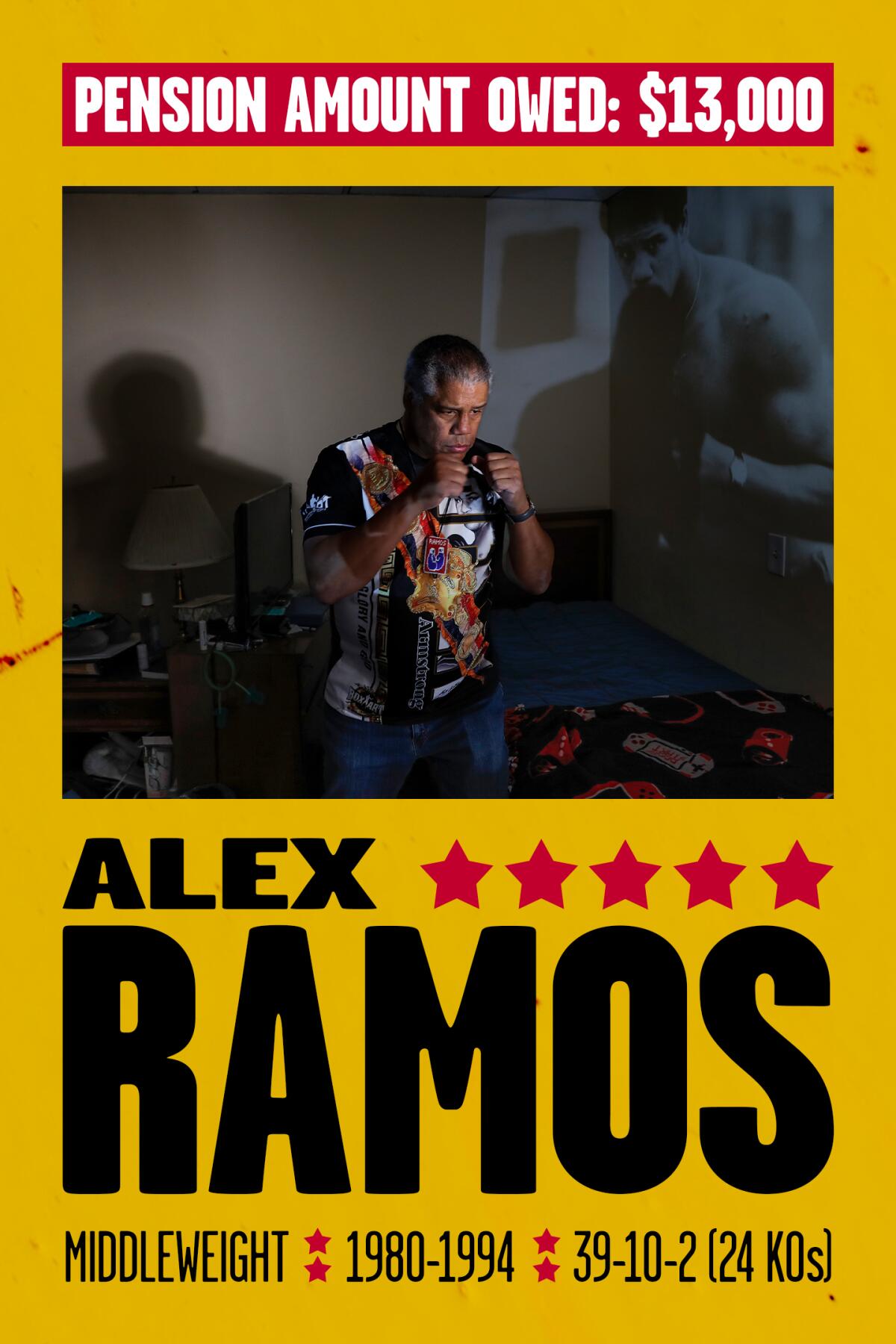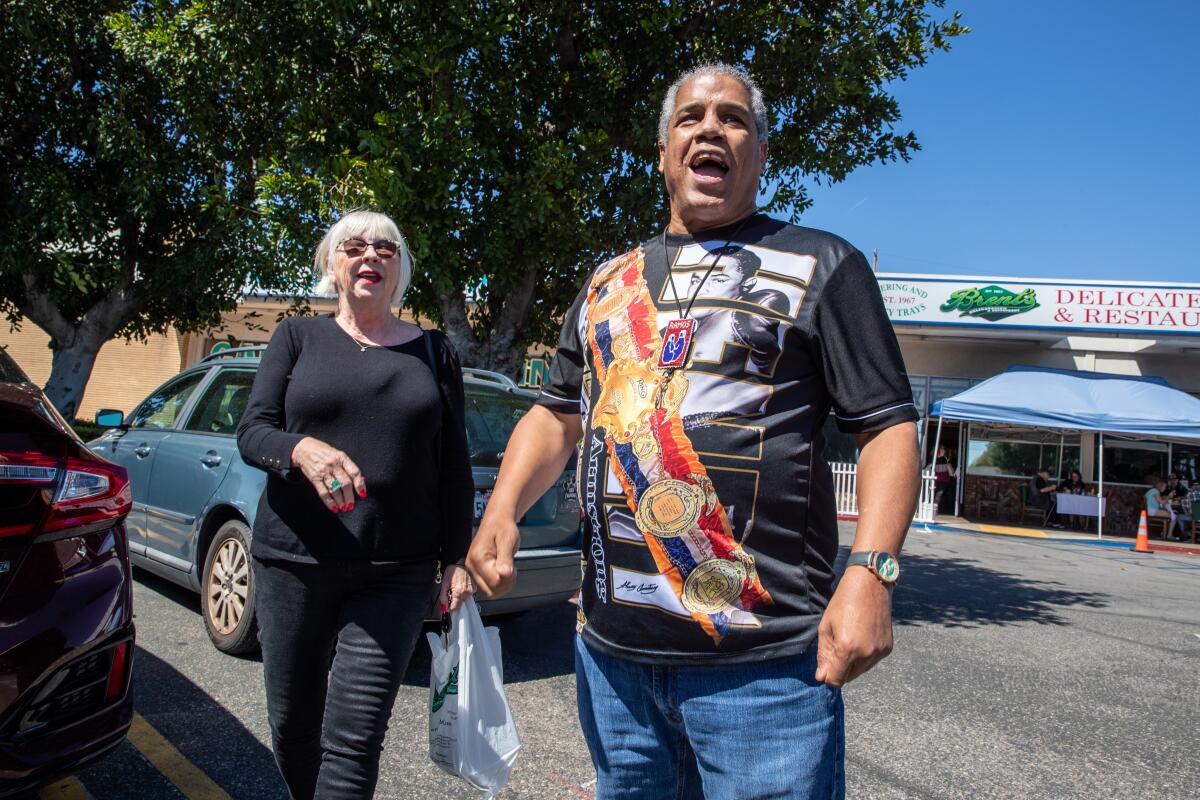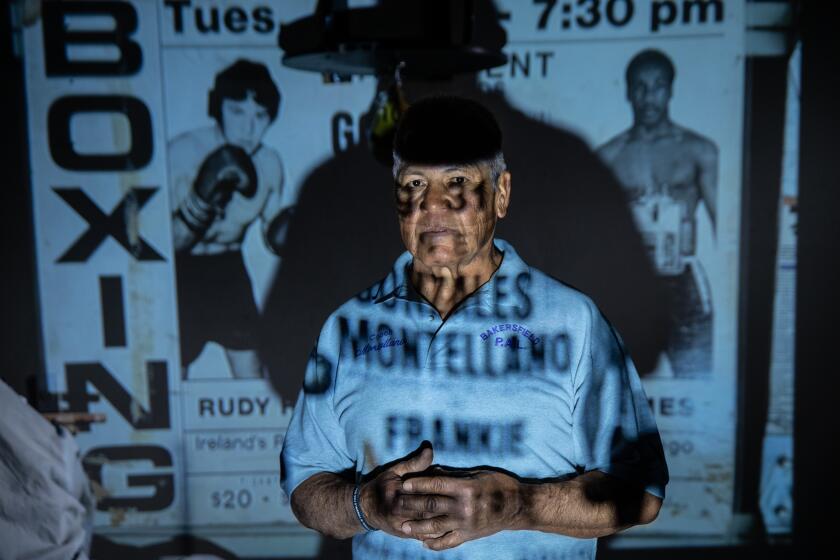Former boxer Alex Ramos faces hardship, but a lifeline is out of reach

- Share via
Alex Ramos built his boxing career on knowing his next move in the ring.
It was seeing beyond boxing that was the problem, said Ramos, a four-time Golden Gloves-winning middleweight known as the “Bronx Bomber,” whom legendary broadcaster Howard Cosell once deemed “a tremendous puncher.”
Ramos was a member of the 1980 Olympic team when the United States boycotted the Summer Games in Moscow and went on to achieve triumphs as a pro. But he fell short of being the next great fighter Cosell and others predicted he would be. He left the sport in 1994 — broke and broken.
“When boxing is over, it’s over,” Ramos, 62, said. “They just drop you like a hot rock and move on to new people.”
Ramos said his troubled transition out of boxing inspired him to start the Retired Boxers Foundation in 1998 to help former fighters get back on their feet. He saw stories about well-known boxers who ended up homeless or unable to afford medical care and knew he wanted to help them.
Boxers contacted by The Times said they were unaware that California has a 40-year-old pension program or that they are its beneficiaries.
“We’ve been able to help hundreds of fighters with the Retired Boxers Foundation,” Ramos said. “We still get phone calls, but we don’t have funding.”
Some of those calls include questions about how to apply for California’s little-known pension program for retired boxers.
Ramos himself, though, has yet to benefit. He is owed $13,000 from the California Professional Boxers’ Pension Plan. It’s money he says he needs, but collecting the funds has posed a dilemma.
The plan offers lump-sum payouts, which would make him ineligible for Supplemental Security Income benefits that pay for his assisted-living facility in West Hills.
“A pension plan should take care of you for life,” said Ramos, who has several medical conditions, including dementia pugilistica, a type of chronic traumatic encephalopathy, or CTE, linked to repeated head trauma.

The only state-administered plan in the nation, California created the pension in 1982 after lawmakers said too many fighters were ending up “injured or destitute.” The program, however, has long been criticized for failing to inform boxers about their benefits.
A Times investigation found that roughly 6% of boxers who could have claimed a pension last year were paid by the California State Athletic Commission, which administers the program.
Most retirees in other jobs receive pensions in monthly payouts over a lifetime. Boxers who spoke to The Times said the athletic commission’s lump-sum provision has made it difficult for those who rely on government benefits to claim their pension without forfeiting more generous housing or medical care subsidies.
In Ramos’ case, his disability benefits require him to have less than $2,000 in assets. Losing that would be devastating for Ramos, said Jacquie Richardson, who co-founded the boxers foundation and now has power of attorney to help with Ramos’ medical care and finances. The foundation is no longer a nonprofit, but still refers needy boxers to services.

“With a real pension, you can get monthly payments,” said Richardson, who retired from the Ventura County District Attorney’s Office. “With the athletic commission, it’s all or none. It puts me in a bad place. Alex can’t survive without these [assisted-living] services.”
Many boxers prefer the lump-sum payout because the total pension amounts are generally small — averaging around $17,000, according to commission records analyzed by The Times. In addition, the commission does not allow pensions to accrue interest or cost-of-living increases, another disincentive to taking piecemeal payouts.
But for some, the lump-sum requirement has meant forgoing the pension. Other boxers who spoke to The Times expressed similar concerns about the potential of losing government benefits they rely on. Richardson said she has recently looked at converting Ramos’ pension into an annuity that will provide small monthly payments without disrupting his disability benefits.
When The Times told the athletic commission about the concerns with lump-sum payments, its executive officer, Andy Foster, pledged that anyone who needed to be paid in installments would be.
“I can do it,” Foster said. “The fact that it’s administratively a little tough is not a good reason for me to say no. I will do it if someone asks. ... This thing is designed to help them out, not to hurt them.”
California owes benefits to about 200 boxers through the California Professional Boxers’ Pension Fund. How to claim a California boxers’ pension.
Ramos, who grew up in the south Bronx before becoming a Los Angeles transplant, retired from boxing with a 39-10-2 record that included 24 knockouts. His rise was paused by stints in prison after a conviction for assault and battery. He pummeled a manager and promoter he alleges bilked him of his winnings, saying he was left with no money for a plane ticket to be with his ailing mother before she died.
He still retains the soft brown eyes and dimpled smile that would have made him the perfect lead in a Hollywood remake of his life. The script would no doubt include a bizarre saga in which a childhood acquaintance was convicted of raping women while impersonating Ramos. The real Bronx Bomber testified at the impostor’s rape trial and reclaimed his identity.
Ramos speaks fondly and hauntingly of his boxing career. It’s what he remembers most clearly these days as he recounts details of decades-old fights while forgetting whom he’s telling the story to on the phone. After years of helping other fighters through his foundation, Ramos says his own future feels unsteady due to his medical issues and financial instability.
“I’m in a tough spot,” he said. “I don’t know what will happen.”
More to Read
Sign up for Essential California
The most important California stories and recommendations in your inbox every morning.
You may occasionally receive promotional content from the Los Angeles Times.
















